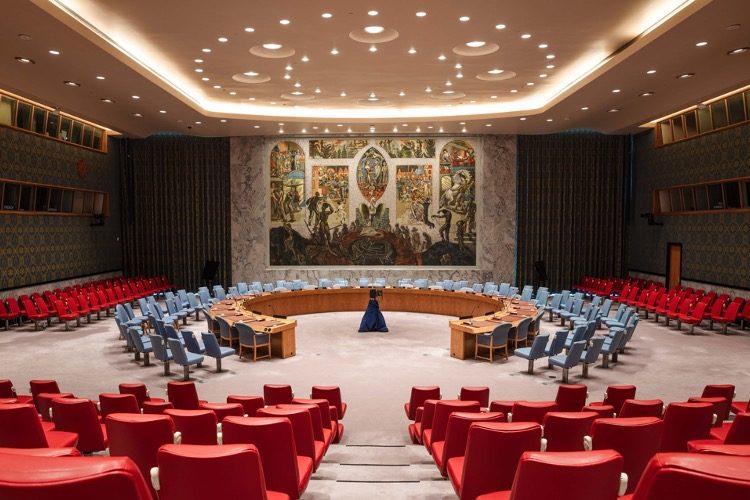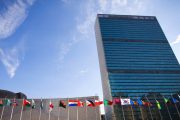
The 15-member UN Security Council (UNSC) is poised to vote on April 19 on a Palestinian application for full UN membership, diplomats commented, as cited by news outlet Reuters. However, observers expect the United States, a staunch ally of Israel, to block the move, as it would effectively acknowledge a Palestinian state.
Notably, a draft resolution that recommends to the 193-member UN General Assembly that “the State of Palestine be admitted to membership of the United Nations” would be put to a vote, according to diplomats quoted by Reuters.
To successfully pass, a Security Council resolution requires at least nine “yes” votes and no vetoes from the five permanent members (the United States, the U.K., France, Russia, and China). Having said that, diplomats have posited that up to 13 council members could back the motion, possibly prompting the United States to use its veto.
Council member Algeria, which introduced the draft resolution, had asked that a vote be conducted for the afternoon of April 18 to align with a Security Council meeting on the Middle East, which various ministers are scheduled to attend.
Based on Reuters reports, U.S. Ambassador to the UN Linda Thomas-Greenfield said on April 17 that she did not think a UN resolution recommending the Palestinian Authority become a full UN member would pave the way toward a two-state solution to the Israeli-Palestinian conflict.
“We do not see that doing a resolution in the Security Council will necessarily get us to a place where we can find … a two-state solution moving forward,” Thomas-Greenfield said.
Rather, the United States has posited that setting up an independent Palestinian state should happen via direct negotiations between the parties and not at the UN.
As per a UNSC committee report viewed by Reuters on April 16, the committee mulling the Palestinian application “was unable to make a unanimous recommendation” on whether Palestine fulfilled the criteria for UN membership.
Besides, left-wing news outlet Axios reported, citing U.S. and Israeli officials, that Palestinian President Mahmoud Abbas dismissed calls by the Biden administration to not proceed with a vote at the UNSC on accepting Palestine as a full UN member. Axios mentioned brewing tensions between the Abbas government and the Biden administration over the past three years over the Biden government’s purported lack of enthusiasm in pursuing a two-state solution.
In particular, the same article claimed, again citing U.S. and Israeli officials, that the Biden administration is trying to stop the Palestinians from obtaining the nine required votes in the council so the United States would not have to exercise its veto. It read, “A US veto of such a resolution, especially amid the war in Gaza, would bring sharp criticism for Biden internationally and inside his own party, including with some of his supporters.”
At the moment, Palestine is a non-member observer state, just like the Holy See, a de facto admittance of statehood that the 193-member UN General Assembly (GA) granted in 2012.
Nonetheless, the UNSC and at least two-thirds of the GA have to approve an application for it to obtain full UN membership.
Strikingly, the UNSC has long championed a two-state solution. It is noteworthy that Palestinians want a state located in the West Bank, east Jerusalem and Gaza Strip, territories that were seized by Israel in 1967.
However, since the signing of the Oslo Accords between Israel and the Palestinian Authority in the early 1990s, progress towards a Palestinian state has been mediocre.
The Palestinian effort for full UN membership comes six months into the Israel-Hamas war and amid increasing Israel settlements in the occupied West Bank.
Additionally, on April 17, the commissioner-general of the UN relief agency for Palestine refugees (UNRWA) told the UNSC that Israel is preventing “life-saving deliveries” to Palestinian refugees as part of an “insidious campaign” to push the refugees out of the “Occupied Palestinian Territory.”
In turn, Israel’s UN Ambassador Gilad Erdan on April 17 decried the UNSC for “investing its time in promoting the establishment of a Palestinian terrorist state.”
“If the Security Council decides to recommend full membership for the Palestinian Authority, which incites and finances terrorism and has no control over its territory, it will lose all legitimacy,” Erdan threatened.
Recounting Iran’s weekend attack against Israel, Biden on April 17 penned an op-ed in The Wall Street Journal calling on lawmakers to pass delayed legislation that would supply billions in military and other aid to Israel.
“If Iran succeeds in significantly escalating its assault on Israel, the US could be drawn in,” Biden warned.
“Israel is our strongest partner in the Middle East; it’s unthinkable that we would stand by if its defenses were weakened and Iran was able to carry out the destruction it intended this weekend. We can make that outcome less likely by replenishing Israel’s air defenses and providing military aid now, so its defenses can remain fully stocked and ready,” Biden added.
Various Israeli officials have indicated that Israel plans to retaliate following the Iranian weekend attacks, despite calls from the Biden administration and other Western nations for restraint.
Per Israeli and U.S. media reports cited by news outlet Today, Israel explored staging a revenge strike on Iran but abandoned the plan.
Israeli public broadcaster Kan reported that after talks with Biden, Israeli Prime Minister Benjamin Netanyahu decided not to carry out pre-arranged plans for retaliatory strikes on Iran.
“Diplomatic sensitivities came into play,” a senior Israeli official speaking on condition of anonymity told Kan, elaborating nonetheless that there would still be a response, but that it would differ from previous plans.
Quoting three unnamed Israeli sources, ABC News reported, “Israel prepared for and then aborted retaliatory strikes against Iran on at least two nights this past week.”



